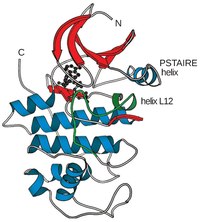
Identification of potential key protein interaction networks of BK virus nephropathy in patients receiving kidney transplantation
Sign Up to like & getrecommendations! Published in 2018 at "Scientific Reports"
DOI: 10.1038/s41598-018-23492-2
Abstract: We aim to identify the key protein interaction networks and implicated pathways of BK virus nephropathy (BKVN) via bioinformatic methods. The microarray data GSE75693 of 30 patients with stable kidney transplantation and 15 with BKVN… read more here.
Keywords: protein; protein interaction; interaction networks; key protein ... See more keywords

Accurate prediction and key protein sequence feature identification of cyclins.
Sign Up to like & getrecommendations! Published in 2023 at "Briefings in functional genomics"
DOI: 10.1093/bfgp/elad014
Abstract: Cyclin proteins are a group of proteins that activate the cell cycle by forming complexes with cyclin-dependent kinases. Identifying cyclins correctly can provide key clues to understanding the function of cyclins. However, due to the… read more here.
Keywords: sequence features; protein sequence; cyclin; key protein ... See more keywords

p53: A Key Protein That Regulates Pulmonary Fibrosis
Sign Up to like & getrecommendations! Published in 2020 at "Oxidative Medicine and Cellular Longevity"
DOI: 10.1155/2020/6635794
Abstract: Pulmonary fibrosis is a progressively aggravating lethal disease that is a serious public health concern. Although the incidence of this disease is increasing, there is a lack of effective therapies. In recent years, the pathogenesis… read more here.
Keywords: fibrosis; key protein; protein regulates; pulmonary fibrosis ... See more keywords

Thrombospondin-1: A Key Protein That Induces Fibrosis in Diabetic Complications
Sign Up to like & getrecommendations! Published in 2020 at "Journal of Diabetes Research"
DOI: 10.1155/2020/8043135
Abstract: Fibrosis accompanies most common pathophysiological features of diabetes complications in different organs. It is characterized by an excessive accumulation of extracellular matrix (ECM) components, the response to which contributes to inevitable organ injury. The extracellular… read more here.
Keywords: protein; protein induces; key protein; induces fibrosis ... See more keywords